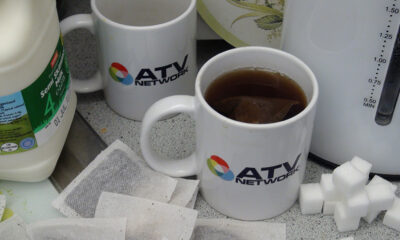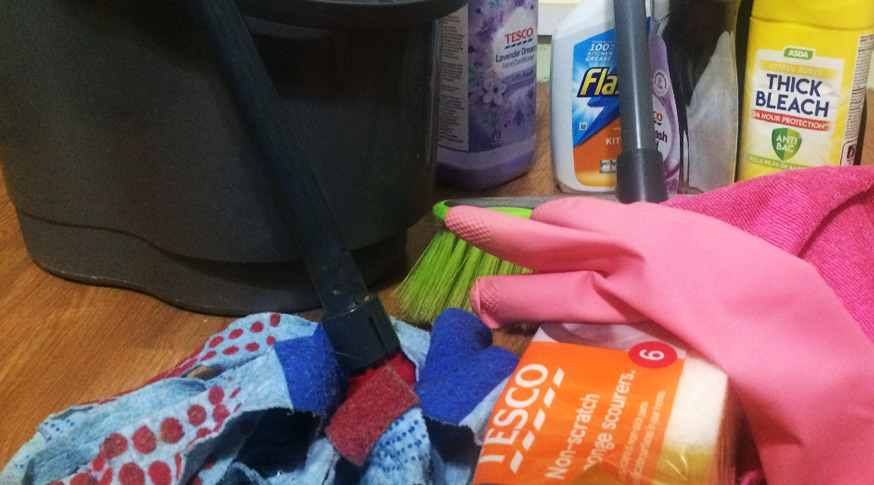In the UK, routine kitchen cleaning tasks can unexpectedly contribute to significant annual household expenses…
This analysis explores various factors that drive up these costs, from the use of disposable products to energy consumption and waste management. Plumbworld, a bathroom and kitchen operation, reveals the hidden costs behind the seemingly simple task of kitchen clean-up, highlighting how everyday habits and product choices can accumulate to significant annual expenses of £692 for average UK households.
1. Disposable Products
Paper Towels and Wipes: The average household may use 2-3 rolls of paper towels per week, costing approximately £1-£2 each. This leads to an annual cost of £104-£312. The reliance on disposable products for kitchen clean-up is not only financially costly but also environmentally unsustainable. The production and disposal of these items contribute to waste and resource depletion, emphasising the hidden costs beyond the price tag.
2. Cleaning Products
Commercial Cleaning Products: Assuming an average spend of £3-£5 per week on various cleaning products, the annual cost could be in the range of £156-£260. The demand for specialised and branded cleaning products can inflate household expenses. Furthermore, the environmental and health implications of chemical-laden cleaners add indirect costs, from pollution to potential health risks associated with long-term exposure to harmful substances.
3. Energy Use
- Dishwasher: Running a dishwasher costs around 37p per cycle for energy. Assuming an average household runs their dishwasher 5 times a week, this equates to roughly £96.20 per year. The energy consumption of dishwashers, while offering convenience, can be a significant contributor to household energy bills. The efficiency of the appliance and the habits of the users (e.g., running half-full loads) can exacerbate these costs.
- Water Heating: Costs for heating water for dishwashing by hand or in the dishwasher can add significantly to energy bills, potentially adding an additional £50-£100 annually, depending on the efficiency of the water heating system and the tariff. Heating water accounts for a substantial portion of energy use, highlighting the importance of efficient practices and appliances in mitigating these expenses.
4. Water Consumption
Water Use: The cost of water varies across the UK, but assuming an average cost of £1.10 per cubic metre and the average dishwasher using around 12 litres per cycle, manual dishwashing could potentially cost more, depending on habits. The total annual cost for water used in kitchen cleaning can vary widely. Inefficient water use, such as leaving the tap running while washing dishes, significantly increases consumption and costs, underlining the need for mindful water use.
5. Waste Management
Waste Disposal Fees: Many UK councils include waste disposal fees within the council tax bill, making it difficult to separate the exact cost. However, improper waste management can lead to increased costs due to the need for specialised disposal or increased frequency of waste collection. The environmental impact of waste, particularly non-recycled items and organic waste not composted, represents another layer of cost in terms of environmental degradation and the lost opportunity for resource recovery.
Strategies for Cost-effective and Eco-friendly Kitchen Clean-up
- Invest in Reusable Cleaning Tools: Choose durable, washable cloths and eco-friendly scrubbers that can be reused. Microfiber cloths, for example, are great for cleaning a variety of surfaces without the need for chemical cleaners.
- Make Your Own Cleaning Solutions: Use ingredients like vinegar and baking soda to create effective, non-toxic cleaning solutions. These natural cleaners can handle everything from greasy countertops to clogged drains, often at a fraction of the cost of commercial products.
- Conserve Water and Energy: Be mindful of your water usage, and run appliances like dishwashers only when full. Consider washing dishes by hand in basins to reduce water usage, and ensure your dishwasher and washing machine are energy-efficient models to minimise electricity consumption.
- Manage Waste Wisely: Compost food waste and recycle as much as possible to reduce your environmental footprint and potentially lower garbage disposal costs. Proper sorting of recyclables and compostables can significantly reduce the amount of waste sent to landfills.
- Opt for Gentle Cleaning Methods: Protect your kitchen surfaces and appliances by avoiding harsh chemicals and abrasive tools. Gentle, natural cleaners and soft cloths can effectively clean without causing damage, extending the life of your kitchen items.
A spokesperson from Plumbworld commented on the findings:
“Embracing a minimalist approach to kitchen gadgets and tools can not only declutter your space but also save you money in the long run. Consider the true utility of each item in your kitchen. Often, a few versatile tools can replace a multitude of single-purpose gadgets, reducing the need for frequent replacements and repairs. This mindset extends to cleaning products as well; a multi-surface cleaner can often do the job of several specialised products, simplifying your shopping list and reducing waste.
“Building a habit of regular maintenance can also have a profound impact on your kitchen clean-up costs. By addressing spills, stains, and crumbs daily, you can prevent the buildup that requires harsher chemicals and more intensive energy to clean. This daily discipline not only keeps your kitchen looking and feeling cleaner but can also prolong the life of your appliances and surfaces, ensuring that your kitchen remains the heart of your home without draining your wallet.”











